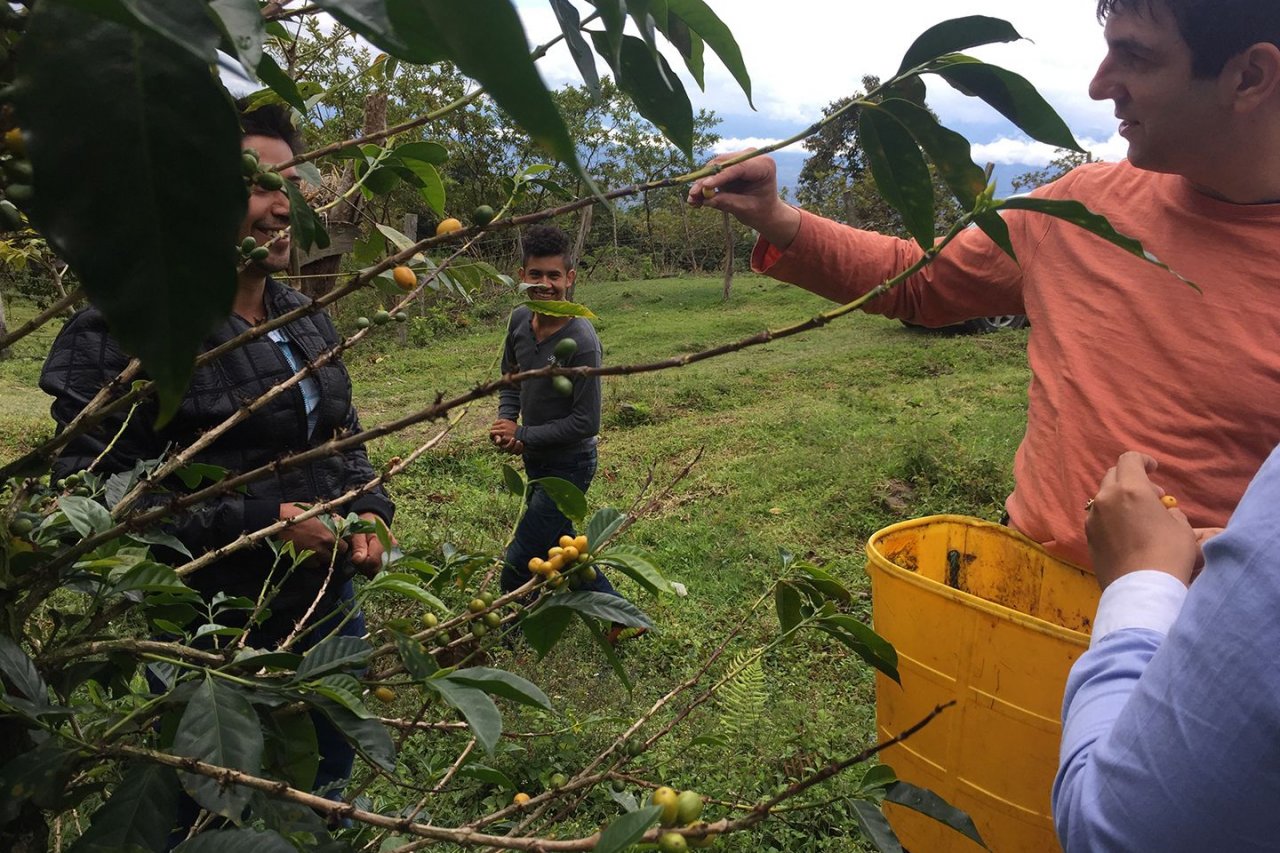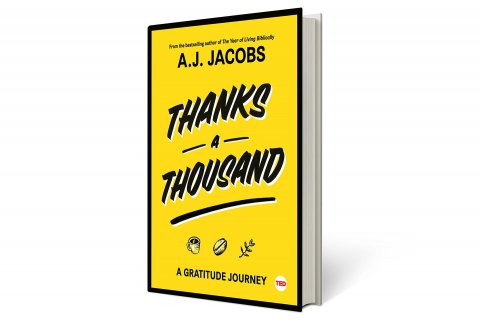
A.J. Jacobs isn't religious, but he likes to begin dinner with a prayer of thanks for all the people who contributed to the family meal: the farmer who grew the vegetables, the trucker who brought them to the store, the cashier who rang him up at the supermarket. You can imagine the eye-rolling from his three sons. One night, the youngest said, "You know they can't hear you, right?"
Jacobs pondered this and realized that his premeal thank-you sessions were a little perfunctory. He decided to commit more fully. It occurred to him that every object he encountered in a day required the effort of thousands of people, many of them below the radar. Jacobs decided he would thank everyone involved in something he can't live without.

Thus was born the "Great Coffee Gratitude Trail," a project that has become his sixth book, Thanks a Thousand, and his second Ted Talk. Jacobs doesn't do things halfway. For his 2007 best-seller, The Year of Living Biblically, he spent 365 days abiding by the rules of the Old Testament—or, as he put it, transforming from a New Yorker who is "Jewish in the way the Olive Garden is an Italian restaurant" into a follower of "the ultimate biblical life." This included growing a ZZ Top beard and sacrificing a goat.
The idealistic aim of his follow-up book, last year's It's All Relative, was to prove that everyone on Earth is related, so can't we all just get along? To that end, he and researchers built the world's biggest family tree, unearthing, among other things, that Ted Cruz is married to Barack Obama's eighth cousin, three times removed. The project culminated in Jacobs throwing the biggest family reunion ever—a party, attended by 4,000 people, at the former site of the 1964 World's Fair in New York City. Sister Sledge sang "We Are Family"—well, three of the sisters; ironically, they weren't speaking to the fourth.
The thing about all of Jacobs's books is that while they are technically stunts, the results are often moving, inspiring and laugh-out-loud funny. Preoccupied with unknotting the moral principles that rule and divide us, and committed to his immersive approach, Jacobs is our Houdini of ethical philosophy.
"If there's a bigger theme to Thanks a Thousand," he says, "it's that, in the creation of any one thing, there are hundreds of people involved from around the globe. With the increasing calls for tribalism and isolationism, it reminds us of how interconnected we are."
We've met at the starting point of his trail: Joe Coffee, at the branch on New York's Upper West Side. Jacobs describes his default mental state as generalized annoyance and impatience. All of his books, to some extent, are about harnessing that nonstop anxiety—his internal battle between his Larry David and Mr. Rogers sides. "Most of the time," says Jacobs, "David has had the upper hand. It's an amusing way to go through life, but not so great for your mental health."
His year of living biblically introduced the idea of radical gratitude, which defines every moment as a blessing, even the worst. "That was when I started pressing elevator buttons and being grateful that the elevator came," he says, "then being thankful that it didn't plummet to the ground and break my collarbone."
Thanks a Thousand is, then, radically radical. There are, indeed, 1,000 people thanked at the back of the book (including Pope Clement VIII, who, it is said, gave papal approval for coffee circa the 17th century: "We shall fool Satan by baptizing it and making it a truly Christian beverage"). And, as Jacobs discovered, each thank-you on the trail yielded dozens more. "The book could have easily been 800 times longer," he says.
So thank him for that. Instead, you have a slim, charming, fact-packed volume that does a nice job of illuminating the many things we take for granted. Jacobs's gratitude commences with the barista at Joe's; by the end of the book, he's picking coffee beans with a family of growers in the mountains of Colombia. But there are less-expected stops: truckers and health inspectors and steel plant workers and a company that makes the invaluable pallets that move the heavy bags of beans throughout the process. "I came to appreciate pallets like I never had," says Jacobs. (Me too.) "Forty-six percent of wood in America is used for pallets!"
Jacobs was regularly disarmed by the passion and ingenuity he encountered—like that of Jay Sorensen, who came up with the idea for the now-ubiquitous Java Jackets that we slip on beverage cups. "I love a little device that has saved billions of fingers from extreme discomfort came from a guy who spilled coffee on himself because his fingers got too hot," says Jacobs. "He said, 'I have to fix this.' It wasn't the R&D department at General Foods; it was just a guy. That that can still happen made me very happy."
He thanked people in person, by phone, by email and handwritten note. The reactions he got ranged from hugs to frank puzzlement. "Thank you for keeping the bugs out of the coffee at the warehouse," he says to the woman who picks up the phone at a pest control company. She is amusingly unimpressed but agrees to hear his spiel. At the end of it, she says, "You're welcome," and hangs up.
Gratitude apparently isn't for everyone. In a 2016 New York Times op-ed, Barbara Ehrenreich argued that gratitude was essentially selfish—a right-wing plot to keep America's workers complacent (as in Walmart employees being thankful for a minimum wage). "She's a great writer," says Jacobs, "but the empirical data suggests she's wrong, and I feel this personally. When I'm depressed, I'm focused solely on myself. When I'm grateful I'm happier and more likely to help others. Gratitude is an enabler."
Jacobs is among those who believes our behavior shapes our thoughts. But he admits that stifling his Larry David can require effort. Every day, he forces himself to act as if he's grateful—faking it until he feels it. At one point in the book, he consults a psychologist about the CEO of Exxon, a man he feels, reluctantly, he should thank. "That was a challenge," says Jacobs. "The trucks that brought coffee to Joe's use gas from Exxon—not my favorite corporation as we hurtle towards an environmental apocalypse."
The psychologist had a nice spin on the problem: Thank him because that might make him happier. "And if he's happier," Jacobs explains, "he might act in a prosocial way and not have this insecure desire to pillage the world and make billions of dollars." (Jacobs concedes that it would be hard to extend that thinking to, say, Adolf Hitler, but you get the idea.)
As we've been talking, Jacobs has been nursing a coffee. He admits that he silently apologizes to Ed, Joe's main bean buyer, when he adds milk to his brew (coffee connoisseur sacrilege). "I was not born a savorer," he says. "But knowing the hundreds of hours and people involved in making this coffee, I force myself to take two seconds now—to think about the acidity, the texture, the sweetness."
It's a philosophy he tries to extend to every moment—savoring and stretching them out. "If you don't make the effort, your life just flies by and you're done."
Thanks A Thousand, A Gratitude Journey (Part of Ted Books), Simon & Schuster, $17, is available here.














